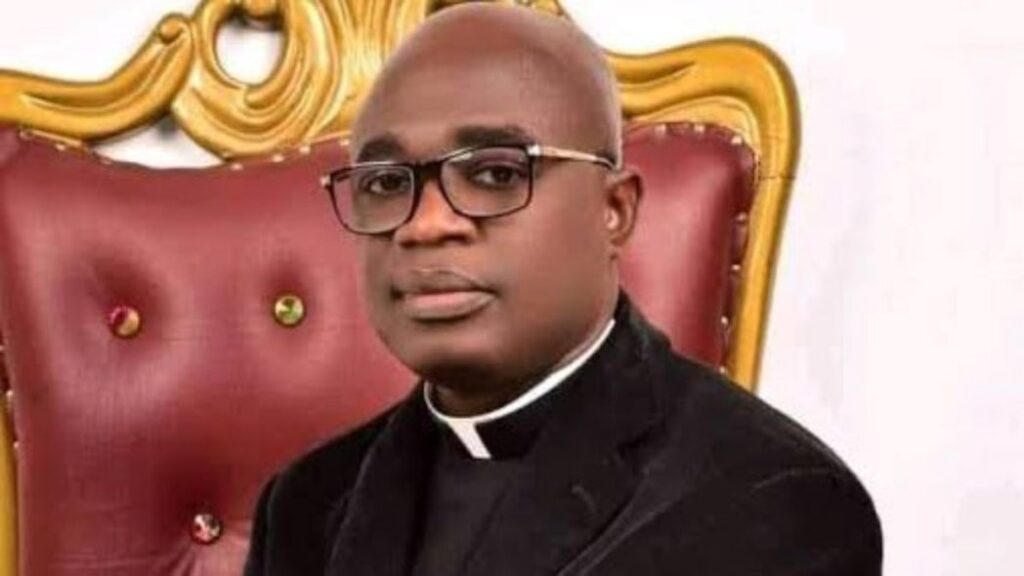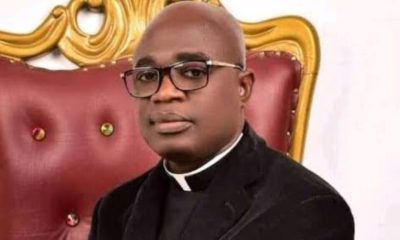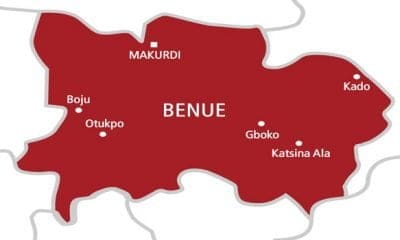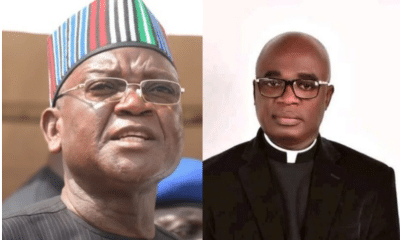Nigeria News
Court Fixes Date To Rule On Benue Gov Alia’s Alleged Abuse Of LG Funds, Unlawful Sacking Of Officials

Justice P T Kwahar of the Benue State High Court in Makurdi has scheduled May 8, 2024, as the date for ruling on preliminary matters in the case challenging the unconstitutional removal of elected local government officials in the state and the subsequent appointment of caretaker committees, which violates the 1999 Nigeria Constitution (as amended).
During the adjournment for the ruling on preliminary issues in the case labelled MHC/346/2024 between Sesugh Akume and the Governor of Benue State, Hyacinth Alia, and four others, the presiding judge announced that once the preliminary matters are resolved, the court will then determine a date for the final judgment.
Naija News understands that on October 24, 2023, Akume, acting as a private citizen, approached the court with a lawsuit against Fr Alia (the Benue governor), the attorney-general, the speaker and House of Assembly, and the special adviser, Bureau of Local Government and Chieftaincy Affairs.
Akume sought an order from the Benue State High Court to declare the removal of the elected local government chairmen in the state as a coup d’etat.
In the suit, the applicant (Akume) argued through his legal representatives that Governor Alia’s actions of sacking or indefinitely suspending the elected local government officials in the state for four months without justification since June 23, 2023, had left the local government system, which is the most crucial level of government closest to the people, without direction. This has resulted in the absence of executive or legislative councils and a complete lack of governance.
The applicant, in his initial summons, emphasized that the 1999 Constitution, which serves as the highest law of the country, only recognizes democratically elected local government councils.
In a personally signed statement on Wednesday, the applicant, Sesugh Akume, informed that the court had scheduled May 8 for ruling on preliminary matters prior to the final judgment.
The statement further outlined the five issues that the court will determine, including whether the governor and House of Assembly possess the authority to suspend elected local government officials, the legality of appointing unelected local government officials based on section 7(1) of the 1999 Constitution and various Supreme Court judgments, and the extent to which this court is bound by the decisions of the Supreme Court on this matter.
It argued; “Whether or not the sections of the Local Government Law that provide for the suspension of elected local government officials are valid and constitutional; the actions of suspending the officials despite an order of a competent court to the contrary are constitutional; and whether or not the removal of the officials is not a coup d’etat, a coup d’etat being an illegal unseating of incumbent leaders by a small group of people.
“The court was moved to find and hold that: the governor and House of Assembly have no such power to suspend elected local government officials, not even for corruption, and any such action is an abuse, a travesty, illegal, null and void; any local government committees or administrators by whatever name called, insofar as they are not voted, are illegal; all sections of the Local Government Law that provide for the suspension of local government officials are illegal, null and void; the suspension of local government officials after the court order is contempt; the unlawful removal of the elected officials is a coup.
“And accordingly, an order: restraining the respondents from appointing unelected local government administrations, and where appointed during the pendency of this suit, an order immediately removing them; setting aside all decisions and communications pertaining to suspension; and an order reinstating the suspended officials along with their authority and full benefits and paying for the time they were away from office.”
He detailed that the legal representatives for the first and second respondents (the state’s attorney-general), the third and fourth, and the fifth respondents each submitted preliminary objections, counter affidavits, exhibits, and written notices in extensive documentation exceeding 400 pages.
SaharaReporters quoted the statement to have read further: “The kernel of their submissions is that: I, the applicant, lack the locus standi (the right to sue) in the matter as I am not a victim of the actions complained about; there is the multiplicity of action and re-litigation as the issues canvassed in the suit have already been determined and the decisions are binding; ‘suspension’ and ‘removal’ of the officials are both used thereby confusing and mixing up issues; the suit itself is ‘defective, nebulous, vague, incapable of being granted’ but is ‘frivolous, with the intention of disturbing, annoying, harassing’ the respondents, as I know or should know that it has no chance of succeeding; and that it is an abuse of court process, and the court lacks the jurisdiction (authority) to entertain it.
“Our lawyers addressed each of the issues raised by the respondents thus, that: the Supreme Court in Centre for Oil Production Watch v NNPC held in a unanimous judgement that any person (human or organisation) is at liberty to approach the court on any matter in the public interest, thereby expanding the meaning, context, and application of locus standi. Furthermore, in ENetSUD v Kwara State Government, the court upheld the right of ENetSUD (an NGO/CSO)–clothing it with the locus standi–to challenge the actions of the Kwara State government in removing elected local government officials and replacing them with appointed stooges. This case was built on the Supreme Court decision in Centre for Oil Production Watch v NNPC and succeeded on appeal.
“Our lawyers, therefore, urged the court to find and hold that I, indeed, have the locus standi, and to dismiss the entire case of the respondents as an abuse of court process re-litigating the issue of locus standi which has forever been settled.
“They argued that the suit is a public interest suit in good faith, an active and responsible citizen’s effort towards local government autonomy, and towards entrenching democracy at the local government level and ending the culture of the impunity of truncating democracy at the local government tier; as the facts and arguments in the matter—which are based on constitutional provisions, statutory provisions, established principles of law, judicial precedents, etc–are unassailable as the issues raised have never been raised in any court anywhere by anybody, and the cause of action is different.
“The lawyers also cited relevant sections of the Local Government Law which use both ‘remove’ and ‘suspend’, with regard to local government officials, interchangeably and interpret both to mean the same thing. Not done, our lawyers filed an amended suit choosing to abandon the first and fourth questions earlier raised, and the prayers associated with them.
“At today’s hearing, the application to expand the time within which file our responses to the respondents’ notices of preliminary objections was unopposed and granted. (It would be recalled that the substantive counsel in the matter had suffered health challenges in the course of this suit leading to some delays as was previously communicated).
“The application to amend the originating suit itself was staunchly opposed. Ternenge Akaa, Esq., holding the brief of Atume Butu, Esq., addressed the court on the fact that a party can bring an application to a court in the course of litigation and an applicant can amend their processes at any time before a judgement. Also, neither the court nor opposing counsel can force an applicant to seek answers to questions he or she is not interested in, nor to seek reliefs they are uninterested in, and pray the court grants the application to amend the originating process and deem it proper before the court for determination and judgement.
“Justice Kwahar considered adjourning the matter for ruling separately on the preliminary issues raised by the respondents and another date for the judgement. Again, T.P. Akaa, Esq., contended that the normal procedure, for efficiency and to save both the court’s and litigants’ time, is to take all the issues at once, and pray the court to set a date for the judgement and during the course of the judgement, to first address the preliminary issues of the court’s jurisdiction to hear the case, etc and then go into the substantive matters as is usually done, to avoid delays as this particular case is also time sensitive.
“This prayer was overruled. The court adjourned to 8 May for ruling on the preliminary issues, after which another date will be set for the judgement. The tenure of the elected local government officials elapses on 29 June.”









